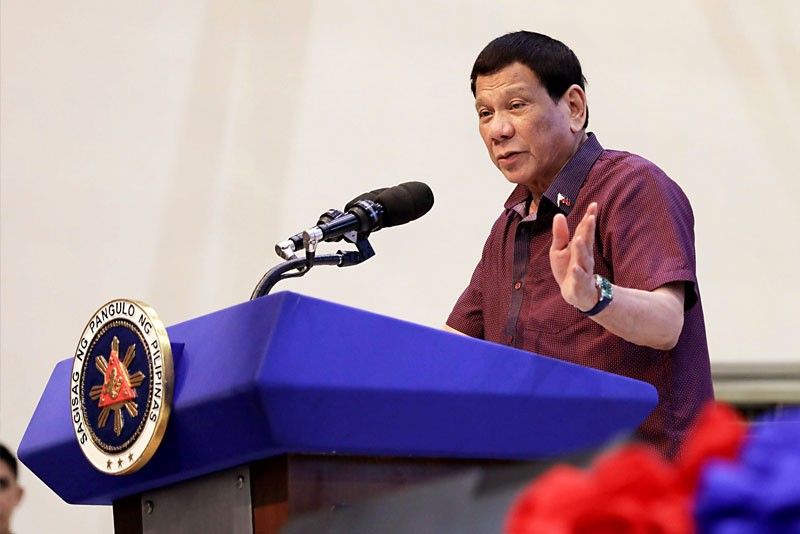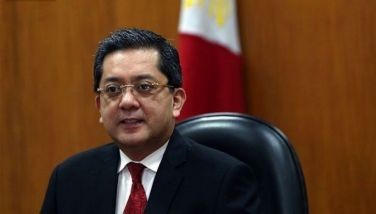House: What about Senate lump sums? Congressmen mum on Duterte’s veto message vs corruption

MANILA, Philippines — House officials were mum on President Duterte’s veto of their “unconstitutional” realignments in the 2019 budget, but would want to hear the Senate explain its own insertions and why these had escaped Duterte’s attention.
“Hindi Biyernes Santo sa Senado ngayon kundi Pasko (It’s not Good Friday in the Senate, it’s Christmas),” Camarines Sur Rep. Rolando Andaya Jr., chairman of the House of Representatives appropriations committee, remarked on learning of the budget veto.
Before the presidential veto was made public, Andaya noted that the lump-sum multibillion-peso realignments of their Senate counterparts seemed to be intact, with the senators “going to town claiming victory over the deletion of the House amendments.”
“It behooves the Senate to tell the people how much of their insertions were carried in the national budget. And how big is the bacon each senator is bringing home,” said Andaya, who served as budget chief when Speaker Gloria Macapagal-Arroyo was president.
“On the part of the House, we have been transparent as to the authorship of the amendments. The Senate has been silent about theirs. It’s time to break their Omerta,” he said, referring to the Italian mafia’s code of silence. He insisted congressmen did the right thing by itemizing their budget.
House officials led by Arroyo have not issued any official statement on the P95 billion worth of pork barrel funds vetoed by Duterte. House Majority Leader Fredenil Castro has also not issued a statement.
Sen. Panfilo Lacson, meanwhile, said he may question the P3.7-trillion General Appropriations Act (GAA) before the Supreme Court if he finds pork still embedded in it.
Lacson said he will wait for the release of the GAA as signed by the President on Monday and go over it to check whether there is still pork or appropriations inserted by members of Congress that were not cleared with implementing agencies and therefore a possible source of corruption.
Lacson also said none of the provisions vetoed were amendments introduced by the Senate.
Cash-based budgeting
President Duterte is bent on implementing cash-based budgeting but will allow the implementation of and payment for infrastructure projects until next year because of delays in the passage of the 2019 budget and the election ban.
Under cash-based budgeting, money has to be spent within a year with a grace period of three months at most. The government previously adopted an obligation-based budgeting, wherein payments are released as commitments or obligations. Under the previous system, a contract can be delivered even after the year it was awarded.
Economic managers have claimed the shift to annual cash-based budgeting would fast-track the delivery and completion of government programs and projects.
In his veto message for the 2019 budget, Duterte said there were “significant gaps” between the actual expenditure and the annual appropriations from 2014 to 2016.
“The dismal spending of agencies translated to billions of pesos delayed and forgone public services which should have been delivered to the general public,” he said. “This is unacceptable given my administration’s commitment to the Filipino people that they will reap, as soon as possible, the benefits of the taxes they have paid.”
To address the gaps, Duterte said he would implement cash-based budgeting to hasten the delivery of public services.
The system, however, would not be enforced strictly this year because of the delayed approval of this year’s national budget and the election ban on public works.
“Concomitantly, let me emphasize that pursuant to the Administrative Code of 1987, I shall mandate the implementation of an operational cash budget for FY (fiscal year) 2019 to ensure the availability of cash resources for priority development projects and speed up the delivery of basic services,” the President said.
“Nevertheless, in view of the delayed passage of the FY 2019 GAA (General Appropriations Act) and the election ban in connection with the conduct of the May 13, 2019 national and local elections, we will allow the implementation of and payment for infrastructure projects until Dec. 31, 2020, provided that the funds for the purpose are obligated not later than Dec. 31, 2019,” he added.
Some lawmakers had expressed concerns over the cash-based budgeting, saying it might reduce the budget for their districts and affect multi-year projects.
The budget department, however, has insisted that the new budgeting system would reduce underspending.
Fiscal discipline
Cabinet Secretary Karlo Nograles said the cash-based budgeting would promote fiscal discipline. He said the executive branch would seek to strictly implement the system next year.
“In its truest sense, this is not the strictest cash-based (budgeting). (Under the system), anything not obligated, that can no longer be spent,” Nograles said at the Kapihan sa Manila Bay media forum yesterday.
“What happened was the full implementation of the strict cash-based budgeting was delayed. Obviously we will try again (to implement the) strict cash-based budgeting,” he added.
Nograles also said they were optimistic that lawmakers would not derail the passage of the administration’s priority bills despite President Duterte’s vetoing of billions of pesos worth of public works projects that were not part of his priority programs.
He said the President merely did what he thought was right when he thumbed down P95.37 billion worth of projects.
“We don’t see any retaliation by Congress for this measure,” Nograles said.
“Nothing personal here. The President just did what he thought was correct and legal,” he added.
“After the elections, Congress will resume sessions. We’re still hopeful that the low-hanging fruits in terms of the legislative agenda will get signed, especially those awaiting approval on third reading or those awaiting bicameral approval,” he said. – With Alexis Romero, Paolo Romero
- Latest
- Trending



























